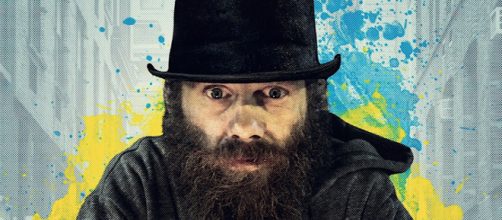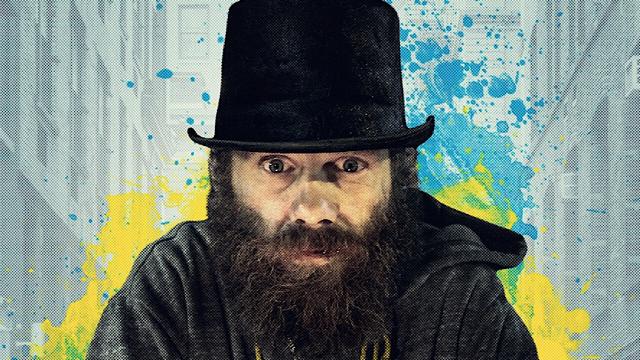Josh Laner is a filmmaker who is currently promoting the release of his documentary film titled “Ken Foster” that focuses on the famed and tormented artist from Vancouver, Canada.
Some regard Ken Foster as “Vancouver’s Vincent Van Gogh.” For eighteen months, Josh Laner followed and documented Ken at work, focusing on his incredible creative process to produce visceral footage of Vancouver's notoriously squalid Downtown Eastside. Despite the artistic abilities that enable him to render distortedly beautiful cityscapes, Ken Foster is a tragic figure.
Addicted to crack cocaine and suffering from schizophrenia, Ken resides in a rundown motel room and cautiously moves through his life and fragmented relationships. When Ken enters into Vancouver's Art Battle competition, a gut-wrenching portrait emerges of a man who is eternally caught in a conflict between ego, very questionable friends, ambition, and the desperate need of a fix.
“Ken Foster” has since premiered at Vancouver’s “Lift-Off Film Festival” where it won Best Picture. It has since gone on the festival circuit in both Canada and the United States. Josh Laner discussed this film and his experiences making it via an exclusive interview on September 17, 2018.
Movies, artwork, production, and mental illness
Meagan Meehan (MM): How did you get into making movies and what is it about documentaries that so appeals to you?
Josh Laner (JS): I’ve always wanted to make movies, and I’m not sure when it started. I always had a video camera as a kid and made odd short Films with my brother and friends. The thing that always appeals to me about documentaries is being able to peer into something that you may know nothing about and being able to broaden my view of the world and find a connection to people that I wouldn’t have thought existed.
MM: How did you first hear of Ken Foster and his artwork?
JS: I first heard about Ken Foster from my co-producer Michael Khazen.
When I first met Michael, he had an office in the Gastown area which is where Ken lives and sells most of his artwork. Michael owned a few of Ken’s pieces and had them hanging up in his office.
MM: How did you go about making contact with Ken and getting him to agree to film this with you?
JS: I had met Ken Foster a few times previous to starting the documentary. Each time buying a painting from him. After the second meeting with Ken my wife, who is also an executive producer on the film, suggested I look into working with Ken. The next day I called my assistant director Taylor Milne and made plans to go find and hopefully convince Ken to let us make a film about him. We got lucky and had someone basically walk us right to Ken and told him we wanted to film him, and he said, “Okay.”
MM: What was the eighteen-month-long production process like?
Was it tough to follow Ken around for all that time?
JS: The first few months were very difficult as we tried to earn Ken’s trust and Ken played a lot of games of keeping us waiting around for hours at a time or just not responding to us at all. Once those barriers broke down it went relatively smoothly, and Ken and I became good friends, and you could tell that it was like there were no cameras around, it all felt natural.
MM: Ken resides in a very poor and dangerous part of Vancouver. Did you ever feel unsafe there and, typically, how did residents react to your camera presence and documentary?
JS: I felt unsafe there more often than not, we were threatened with physical violence on more than one occasion.
Nothing was sanitary about the place; we even wore paper hazmat suits because of the number of bugs and rotten food and urination and feces and vomit. We tried our best to keep a very low profile; there were times when I was the only one there while filming. Most of the residents in his building had no problem with us as long as we weren’t filming them and the majority of the time the filming took place in Ken’s room.
MM: Ken has issues such as drug addiction and mental illness. How did you cope with those realities while filming him?
JS: Looking back I don’t know how we coped with it. His room is small and filled with junk, and he’s smoking his crack pipe the entire time. The room was filled with smoke and spray paint fumes.
I wore a face mask on and off during the production. His mental illness never showed itself in harmful or dangerous ways.
MM: What is your favorite scene in the documentary and why are you so fond of that particular moment?
JS: It’s after the 2nd Art Battle, and we’re chatting about how I think he purposely made a bad painting and there’s just something about the way he’s looking at me and the way we are conversing that makes me feel like we’d become such true friends. I still care for him deeply.
MM: What does Ken think of the movie and has its creation helped him promote his art and/or better his quality of life at all?
JS: Ken’s first response to seeing the movie was that he was amazed at how much he curses and he also said it was fascinating to see the way someone else views his life.
The film has had little effect on his daily life. He’s doing the same thing today that he was doing three years ago and he was doing that same thing ten years ago. It’s just the cycle he’s made for himself.
Festival circuits, new documentaries, and dreams
MM: How did you get this movie into the festival circuit and what is it like to win all these awards?
JS: I’ve always loved trying to get my films into festivals. I think it was before I ever imagined getting a distribution that I saw it as a way of validating what I was doing. My first film “Wastings & Pain” got accepted into two festivals and even won an honorable mention, and that got me hooked and inspired me to try to make bigger films.
MM: What other movies/documentaries are you planning or working on?
Which subjects do you think you might like to make a documentary about in the future?
JS: I have a few concepts for new documentaries that I’ll be filming some preparatory interviews for in the very near future. I’m not ready to discuss the actual topics yet.
MM: What are your dreams for the future of your documentary making career and is anything else that you would like to add?
JS: My biggest dream is to have someone come to me and tell me they want me to direct a big budget documentary for them.



